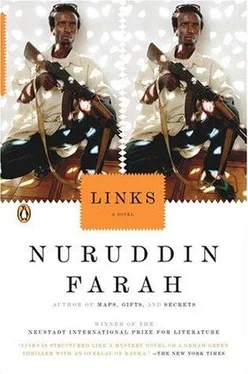Jeebleh could think of nothing to respond.
“Let’s blame it on the civil war,” Bile said remorsefully. “Let’s blame it on our sick minds, on the tantrums that belong in our heads. Let’s blame it on the endemic violence, the cruelty that’s been let loose on the weak. Let’s blame it on our damaged sense of self.”
“But what did she accuse him of?”
Still Bile wouldn’t say, and he left the room.
“HAVE WE GRIEVED ENOUGH?” JEEBLEH ASKED.
“I doubt that we have,” Bile replied.
“Do we know how to grieve? And if we don’t, why not?”
“I don’t know if it is possible to have a good, clean grief when people have no idea how big a loss they have suffered, and when each individual continues denying his or her own part in the collapse.”
“Aren’t many Somalis mourning?”
“We mistake a personal hurt for a communal hurt,” Bile insisted. “I find this misleading, I find it highly unproductive.”
Jeebleh recalled Bile’s early loss of his own father, allegedly at Caloosha’s hands. Seamus had lost his brother, a sister, and his father to sectarian violence in Ireland. Does a child mourn a loss in the same way an adult does? Is there a time limit, a cutoff point after which grieving becomes ineffective?
“How have you coped?” Jeebleh asked.
“I’ve kept myself infernally busy, and I attend to other people’s needs, not mine. I haven’t had the time or the strength to grieve or to deal squarely with the ruin that is all around. Instead I wallow in my sorrows often enough, and feel a more profound despair when I think I might have achieved something more substantial if I had intervened politically, and tried to make peace between the warring sides.”
“Why haven’t you tried to do that?”
“I hadn’t realized until seeing you that I jumped in at the deep end on the day I gained my freedom and decided to stay, and when I chose to set up a refuge, look out for Raasta, be close to Shanta, who is forever needy, and not enter what passes for politics hereabouts.”
“Is there anybody for you to talk to?”
“It’s too late for me to search out interlocutors worth taking seriously and trusting, too late for me to get involved in peacemaking now.”
“Why is that?”
“I would be like an ant that got distracted and went out of the line and is now trying to find its way back into the ranks after a storm has disorganized the line.”
Bile’s worries were posted on his forehead, visible signs of what weighed on his mind. Jeebleh’s own restless thinking led him to his preoccupations. Unlike Bile, who had stayed away from “what passes for politics hereabouts,” he had taken the plunge into the chaotic energy of the place. Now, as a consequence, he was getting lost in the claims and counterclaims of clan politics.
A cat entered the room as though it had more rights to be there than Bile, the resident of the apartment, or his guest. To judge from the way Bile stared at the creature, they were strangers to each other; Jeebleh sensed an unspoken hostility. The cat looked at Jeebleh, then at Bile, then blinked at them both, and made itself comfortable as only cats can in a place where they do not belong. It took its feline time, stretching, yawning, looking at them again. It looked at Jeebleh and smiled, then at Bile without smiling, and caressed its whiskers, Jeebleh thought, in the brooding manner of a man pretending to be thinking.
“Have you met StrongmanSouth?” Jeebleh asked.
“I’ve never met him, and I have no desire to shake the hand of a murderer,” Bile said. “Nor would I want anyone to misunderstand the purpose of my visit, if I were to visit him, and give it a clannish spin, considering that we belong to the same bloodline, he and I. I’ve chosen to take my distance from him, not least because I want everyone to know that I do not approve of his murderous policies, precisely because The Refuge is in the territory under his nominal control.”
“Have you considered asking him to give a hand in recovering Raasta and her companion? After all, the abduction took place in the territory under his nominal control.”
“To what end?”
“You don’t think he will help?”
“I am doubtful that he will.”
“But do you think he knows of the abduction? Might he even be behind it? Or do you feel that he won’t help you in any way, knowing that you are a man of peace and he is not?”
If one’s life was made up of a million moments of truth, Jeebleh thought, his sending off the clan elders and his subsequent intervention on behalf of the Alsatian were among his momenti della verità, actions that were undeniably significant, leading, as they did, to a sea change in him. It wouldn’t do to dwell on these grave moments of truth.
At long last Bile spoke, but only to say, “I don’t know.”
“Why haven’t you been in touch with Caloosha?” Jeebleh asked.
Bile looked quizzically at Jeebleh: Had he too heard a knock on the door? A moment later, their gazes traced the tapping to a sparrow throwing its weight against the windowpane. The cat looked up expectantly. Bile rose, hesitating over whether to let the bird in or not, and then opened the window to let the sparrow decide. The bird flew in, wheeled around the room, turned, and flew off, safe.
“I wish not to have any dealings with either Strongman or Caloosha,” was all Bile was prepared to say.
“A boy murders his brutal stepfather in cold blood,” Jeebleh said. “Does such a boy, who has suffered years of cruelty at the murdered man’s hands, mourn his death? Does the son of the murdered man, a half brother to the killer, mourn the loss of a father he’s never known?”
When Bile didn’t react, Jeebleh recalled the words of Bile’s mother, couched in regret, referring to her own role in raising Caloosha. “It’s very difficult,” she had said, “to rid yourself of the monster whom you’ve given birth to yourself, fed, raised, and looked after, and then let loose on the world.” She was responding to the clan elders, who were all men, and their tendency to blame women and point to what they called “the lax side of a mother’s nature.” Caloosha had killed his stepfather, yet the clan blamed his mother for it.
HAGARR, THE MOTHER OF CALOOSHA, BILE, AND SHANTA, MARRIED THREE times. She was a strong-minded woman, and didn’t hesitate to do as she wanted. When the opportunity to go to Italy on scholarship to train as a midwife presented itself soon after the nikaax, her engagement, she went, in opposition of her future husband’s wishes. Later, when he suggested that she give up working, because he could afford to provide for her and their son, Caloosha, she refused to do so. She was one among a handful of Somali women who had finished their secondary education, and could earn their own keep, and she dreaded the thought of relying on a man’s handouts. A woman with foresight, she knew that the day wasn’t far off when her husband would look for and find a younger, prettier woman, one prepared to do a wealthy man’s bidding. And as soon as this happened, Hagarr insisted on a divorce.
She moved out of his house into that of her elder brother, where she and Caloosha, then a three-year-old, were given a room with a separate entrance. It wasn’t long before she discovered that sharing space with her sister-in-law was no easy matter. She found accommodation in a rooming house, and hired a series of young maids to look after her son. She didn’t care when society accused her of what some called “dereliction of duty as a mother.” But she was bothered when her husband threatened her with court action.
Caloosha was a very difficult child to raise. He was impossible to discipline, and he displayed unusual cruelty early on. Already at age three he was adept at throwing knives, the way you throw darts at a dartboard, though he preferred living targets. He lit matches out of mischief, nearly setting the house on fire. Many of the young women Hagarr hired to look after him left within a short time.
Читать дальше












